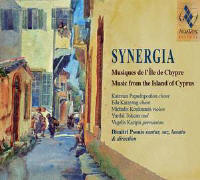Texte paru dans: / Appeared in: |
|
|
Outil de traduction (Très approximatif) |
|
|
Reviewer:
Ivan Moody This album showcases, poignantly at this time of escalating political tension in the eastern Mediterranean, the multicultural riches of the island of Cyprus. Dimitris Psonis has always been a versatile musician; not only he is he deeply versed in the musical traditions of his native Greece but he has worked on projects that used to be described as ‘crossover’, notably with Jordi Savall, on whose label, Alia Vox, this recording appears. Earlier collaborations include the ‘Jerusalem’ project (4/09) and the remarkable disc of music by Dimitrie Cantemir (7/10). Here he has devised a rich and varied programme of music from Cyprus, encompassing both Greek and Turkish traditions, and it is worth revisiting that word ‘crossover’, because it suggests something artificial, even when it works. In reality, the parallel cultures of Cyprus show precisely how different traditions could coexist and enrich each other over a long period – which is why this album, as long as we remain concerned with categories, cannot be classified only as ‘folk music’ but also as ‘early music’. The final verse of the song ‘Fesligan – Ipsintri vasilija mou’ (‘My slender basil’) and ‘Gazel – Ada Sahilleri – Matia Mou’ (‘I am waiting – My eyes’) perhaps best demonstrate the disc’s title, so obvious is the synergy between the Turkish and the Greek in that they feature both solo singers, Katerina Papadopoulou and Eda Karaytug, but throughout one is conscious of the vital energy and sheer beauty of these two traditions. The rich, resonant voices of Papadopoulou and Karaytug are not only mesmerising in themselves but complement each other in the most extraordinary, intimate way. And the instrumentalists are not only masters of their own traditions but masters of collaboration; it should not be forgotten that the musical life of the Ottoman Empire included many Greek chanters who also worked as musicians at court, and this legacy persists today. Transliterations into the Latin alphabet of the Greek titles in the beautiful accompanying book look curious because there has been an attempt to reproduce Cypriot pronunciation, but it is rendered doubly opaque even to the Greek-speaker because of its preservation of an essentially French orthography. But in these matters some decision needs to be made, and this quibble is as nothing set alongside the beauty of this outstanding recording. |
|




